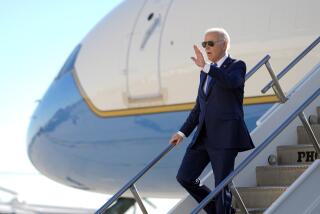Major Finds Unlikely in Iraq Report
- Share via
WASHINGTON — An upcoming report by the CIA’s chief weapons hunter in Iraq will offer no firm conclusions about Saddam Hussein’s chemical, biological and nuclear weapons programs, senior officials said Wednesday.
David Kay, a former U.N. weapons inspector, is to deliver his report to Congress next week. In arguing their case for invading Iraq, U.S. and British officials said Hussein had stockpiles of chemical and biological weapons and had restarted efforts to build a nuclear bomb.
So far, U.S. and British officials have not disclosed any discoveries that would validate their prewar assertions. On Wednesday, U.S. officials sought to play down expectations that Kay’s report would contain any major revelations.
“Dr. Kay is still receiving information from the field, and this will be just the first progress report, an interim report, and we expect it will reach no firm conclusions, nor will it rule anything in or out,” said CIA spokesman Bill Harlow.
He said it has not been determined how much, if any, of Kay’s report would be made public. After the report is complete, Kay is expected to return to Iraq to continue his investigation.
After a summer visit to Iraq, Republican senators said U.S. searchers had uncovered solid evidence of weapons programs. But Democrats on the same trip said the evidence was not definitive. None of them provided details.
Criticism of the Bush administration’s rationale for going to war has grown on Capitol Hill and overseas in recent weeks.
Wednesday, Democrats seized on comments by Secretary of State Colin L. Powell -- still posted on the State Department’s official Web site -- from Feb. 24, 2001, in which he told reporters during a trip to Egypt about the success of the decade-old economic sanctions in containing Iraq.
In his remarks, which were unearthed by an Australian journalist and broadcast on the BBC in Britain, the secretary of State said Hussein “has not developed any significant capability with respect to weapons of mass destruction. He is unable to project conventional power against his neighbors.”
One senior intelligence official said recently that Kay’s early analysis of Iraqi documents will prove that Hussein had the “intent” to resume chemical and biological weapons production once sanctions were lifted and United Nations inspectors were gone.
Kay said last month he was initially focusing on Iraq’s program to deceive U.N. inspectors and that his report would contain illustrations of how large that effort was, using it to indicate there were weapons to be hidden. After testifying before the Senate Armed Services Committee, Kay told reporters that his team had “found some physical evidence.” He added: “I think it’s very likely that we will discover remarkable surprises in this enterprise.”
More recently, however, other officials, some of whom have spent time in Iraq, said the survey team had not gathered any substantial information, in part because military members of Kay’s 1,200-person Iraq Survey Group were threatening and arresting some Iraqi scientists and technicians who had worked on weapons programs.
The expectations for Kay’s interim report have changed significantly in the last few weeks. On Sept. 7, Powell told NBC’s “Meet the Press” that the report would show “that there was no question that such weapons exist, existed, and so did the programs to develop one.”
A week later, Vice President Dick Cheney, also on “Meet the Press” said, “I think David Kay will find more evidence as he goes forward
But national security advisor Condoleezza Rice told reporters three days ago that there “may” be interim reports from Kay, although “I don’t know what the public nature of them will be.”
More to Read
Sign up for Essential California
The most important California stories and recommendations in your inbox every morning.
You may occasionally receive promotional content from the Los Angeles Times.













